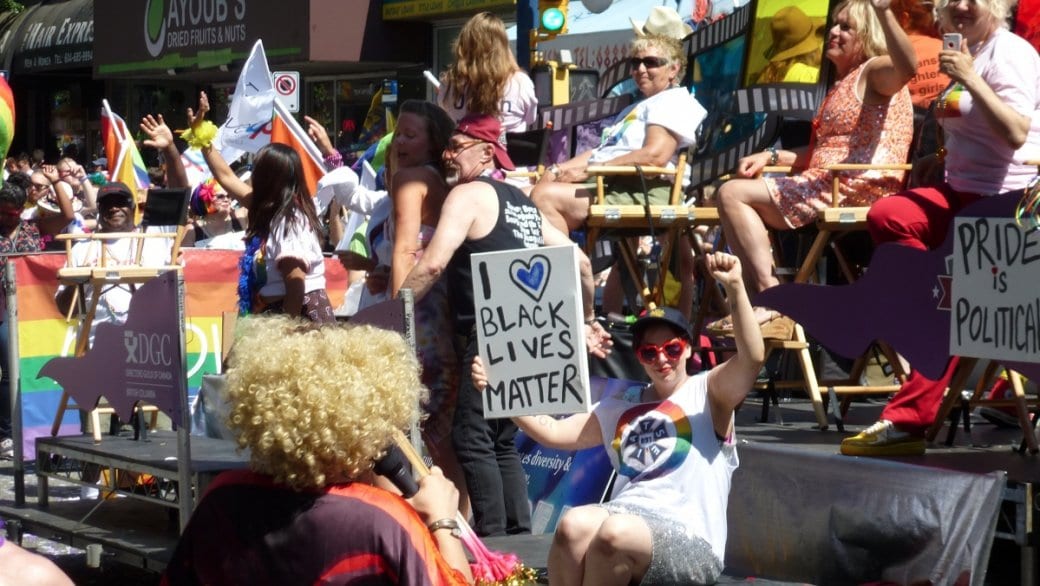The Vancouver Pride Society has apologized for its slow response to “anti-Blackness and racism within our LGBTQ2+ community,” in its monthly newsletter released on Feb 22, 2017.
The apology follows a meeting that VPS board members and executive directors had with members of Black Lives Matter Vancouver, who presented examples of the racist comments they’ve endured since asking Pride to oust police from the parade.
At the Feb 21 meeting, members of BLMV showed the VPS screenshots of death threats, racist, violent and hateful comments that had been posted to various social media channels.
The VPS unequivocally condemned the backlash against BLMV and called it “absolutely not acceptable,” both in its newsletter and in a Facebook statement posted the same day.
“As activists are entitled to do, Black Lives Matter Vancouver has made some pretty clear demands. And, as a result of those demands, their members have faced racist backlash, hate mail, death threats and other forms of violence,” the VPS states.
“This is absolutely not acceptable, and the Vancouver Pride Society condemns that type of behaviour unequivocally.
“These events, along with comments we have read on social media, news stories, and in correspondence we have received, make it clear that there is a significant amount of anti-Blackness and racism within our LGBTQ2+ community,” the VPS continues.
“This is not okay, and we must all do our part to speak out against it whenever we see it. The Vancouver Pride Society acknowledges we have not been quick to act in the past, and for this we are sorry.”
VPS co-executive director Andrea Arnot elaborated by phone.
“All the people who are posting hateful things, they’re adding to the need for us to step up for allyship,” she tells Xtra. “When people make hateful comments like that it reinforces that, yes, there is actually a problem out there.”
If the commenters’ goal was to tear down or undermine BLMV’s stance, their comments have had the opposite effect, she says.
Arnot says the VPS had already been monitoring its social media channels and comments posted by community members, but seeing all the hate directed at BLMV and others in one place was “very impactful” for the board of directors, Arnot says.
“It brought to light that there is racism and, as BLM put it, anti-blackness, happening within all these conversations, so they asked us to make a statement. They said they need help from people who are in positions of power and privilege, who have a voice to make those statements and be firm about them.”
In its newsletter and Facebook post, the VPS also updated the community on suggestions they made to police earlier this month regarding their participation in the 2017 Pride parade.
“We know the Parade in 2017 needs to be different to make everyone feel safer, so we have made some suggestions,” the VPS says. “These were inspired by Black Lives Matter Vancouver’s open letter from 2016, as well as community consultations that have taken place over the past six months.”
The VPS says it has asked the Vancouver Police Department to march in t-shirts rather than in uniform; to reduce its presence among the City of Vancouver’s other civic services (since police have at times represented up to 45 percent of the City’s parade entry); to enter fewer vehicles in the parade; and to commit to “further meaningful engagement” with populations who feel unsafe at the parade.
Arnot says the VPS is still seeking a solution that will allow for some police participation but with a smaller footprint. She says she is mindful that some community members are proud of their positive relationships with law enforcement, but she says Vancouver is no exception to the systemic transphobia, homophobia, racism and sexism still permeating powerful institutions such as the police.
“There are many members of the queer community who can remember a time when they were scared of police, and we are working really hard to have police participate and to have them want to participate. But when it comes down to it, the people who are the most marginalized and the most vulnerable have to be listened to.”
Spokespersons for BLMV declined to comment for this story, opting instead to address the VPS’ police suggestions in a Facebook Live video on Feb 22.
“Hopefully we can have a conversation around the police responsibilities to the LGBTQ community, and how they can show that to us moving forward with these events,” BLMV co-founder Daniella Barreto said online.
Barreto noted the Halifax police as a positive example of stepping out of their local Pride parade for the good of the community. She hopes Vancouver police show up without their uniforms and step out of the parade too, so that everyone can feel safe.
“All the backlash from people saying that they have worked hard to forge relationships with the police — if those relationships are real, then police officers with whom they have relationships . . . will show up without their uniforms to support these communities at these events. They should step out [of the parade] so that everyone can feel safe,” she said.
Co-founder Cicely-Belle Blain added that BLMV’s ultimate goal remains the complete removal of police from the Pride parade.
In a Feb 9 email, Staff Sergeant Randy Fincham, media spokesperson for the VPD, told Xtra that police are planning to participate in the Pride parade.
“The VPD is looking forward to working with our community partners with Black Lives Matter and the Vancouver Pride Society, and have our volunteers and civilian and sworn staff walk with pride for our 21st year in the 2017 Vancouver Pride Parade,” he wrote.

 Why you can trust Xtra
Why you can trust Xtra


